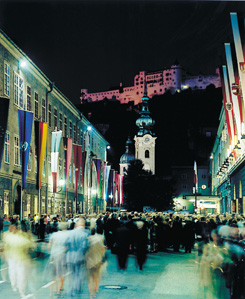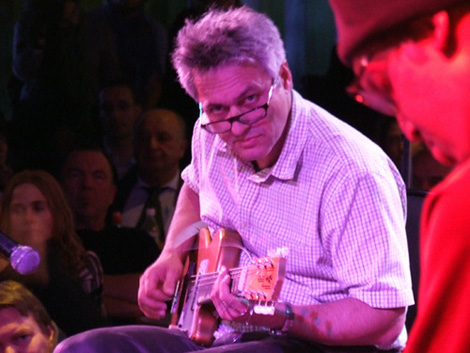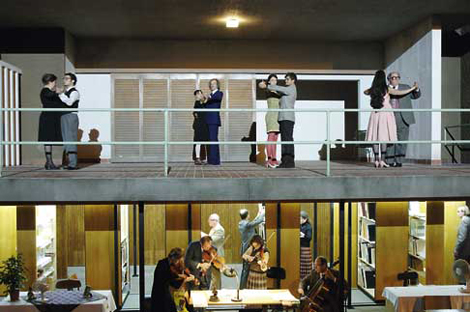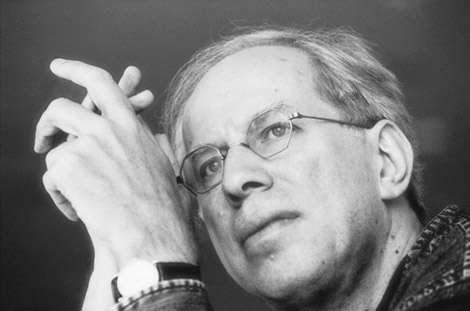Ok, this year’s festival was a short one for me. I saw only a couple of performances but some of these were really excellent!
1) Grisey: Les Espaces Acoustiques. I’ve already written about that one on this blog.
2) Then there was this other concert from the Kontinent Scelsi series. An evening with the Ensemble Dissonanzen and Marc Ribot, whose Morning Scelsi was combined with several of Scelsi’s own compositions. While I was initially very enthusiastic about this idea, the performance itself turned out to be a let-down. First of all, Ribot’s music is not really ingenious, it’s not even convincing. Second, at times the performance was so loud that it started to be painful for one’s ears. What I liked about the evening, though, was the superb performance of the first two pieces from „Tre pezzi“ for saxophone by Scelsi.
3) Scelsi/Marthaler/Klangforum Wien: Sauser aus Italien. Eine Urheberei. I saw this excellent production twice and if I had had the chance I would have gone a third time. Marthaler created a theater play around several of Scelsi’s pieces. The fine performance by the Klangforum Wien and the impressive playing by Marthaler’s family (as he calls his actors) was my personal highlight of the festival. Imagine a stage design that incorporates seemingly random items such as buddha statues, tape recorders, candles, oriental table linen, and antiquarian radios (in fact most of these things can also be seen on images taken in Scelsi’s study). This imaginary Scelsi-landscape is inhabited by strange characters who seem to be living in the same apartment block. The whole performance spans over the time of one day, starting with a surreal breakfast scene that features an essentially one-note piano piece by Scelsi and ending with a cocktail party that is accompanied by a Respighi (?) piece for orchestra. In the course of the day the characters listen to several pieces by Scelsi, and what’s really cool to observe for us are their reactions to the music. Sometimes they are delighted, sometimes their are frightened. They dance, dream, wonder, dislike and detest – the whole gamut of human reaction to music is there. Of course – one can ask, why do you have to create a theater play that goes along with contemporary music? The answer is: just for poetry’s sake. Nothing more and certainly nothing less.
4) Gidon Kremer, Tatjana Grindenko, Mischa Maisky and Valery Afanassiev. It’s always the same problem when chamber music is performed by musicians who rarely play together. Delicate entries are seldomly together, the sound of the ensemble is often out of balance, and since many famous performers apparently have no time to practice, the difficult bits and pieces never quite work. The Brahms sonata No 3 in d minor (with Afanassiev) was completely obnoxious, as were the first two movements of the Bartok sonata for solo violin. The remainder of the evening was much better (second half of Bartok and the Prokofjew sonata for two violins) – at times even breathtakingly beautiful (the Shostakovic trio in e minor). This, by the way, is also typical for great performers: they know exactly which parts to practice and play well – it’s always the last piece of the evening that the audience keeps in mind. In this case, everyone will have the recollection of a wonderful chamber music evening.








Whoever you are, thank you for your piece on the Marthaler/Scelsi work. I’m envious and would love to see it. Here in Berlin, it seems we have lost Marthaler to the ego-plays of one Castorf, the director of the Volksbuehne.
Regards
Hi Gregory!
Thanks for your kind words! :-) Can you imagine that I lived in Berlin for almost two years and did not make it to a Castorf-performance?
Best wishes and thanks for reading!
Matthias